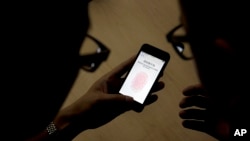Two U.S. senators are working on legislation that would pressure technology companies to unlock privacy controls on their smartphones, when requested by law-enforcement againcies, or face the possibility of court-ordered penalties.
The proposed legislation, still in its early stages, is sponsored by California Senator Dianne Feinstein, a Democrat, and North Carolina Senator Richard Burr, a Republican. The lawmakers say their bipartisan bill would respond to increasing concern about criminals who use encrypted communications to evade prosecution.
Technology experts say attempting to control cellphone manufacturers' encryption techniques is a dangerous intrusion on corporate affairs and also disregards individuals' right to privacy.
Kevin Bankston of the New America Foundation’s Open Technology Institute, told Wired magazine that, based on what he has heard about the Feinstein-Burr legislation, “This is easily the most ludicrous, dangerous, technically illiterate proposal I’ve ever seen.”
The White House has held off on taking a position on the issue while the senators' offices work toward a final draft of the bill. A spokesman for the lawmakers declined to discuss the language of the proposed legislation, but said "there has never been any talk about imposing fines on companies."
The action on Capitol Hill apparently was sparked by a lawsuit brought against the Apple company by the FBI, which asked a court to force the iPhone manufacturer to break into one of its devices - a phone that had been used by one of the terrorist attackers involved in the assault last year in San Bernardino, California. Federal agents said they were unable to unlock the phone's protected data themselves; Apple said the phones had been designed to resist intrusion, and it, too, had no way to break through the encryption.
The government action aroused immediate protests by privacy advocates and appeared headed for a protracted battle in court, but the case was dropped when federal officials abruptly announced they had found a way to access information on the phone. It is not known how they managed to circumvent the phone's software, or what sort of data they gleaned from the phone, which had been used by San Bernardino gunman Syed Farook, a supporter of the Islamic State group, until he died in a shootout with authorities.
An early draft of the Senate bill that has circulated among news media says, in part: "...All persons receiving an authorized judicial order for information or data must provide, in a timely manner, responsive and intelligible information or data, or appropriate technical assistance to obtain such information or data.”
A spokesman for Feinstein and Burr told VOA Friday: "We're still working on finalizing a discussion draft and as a result can't comment on language in specific versions of the bill. However, the underlying goal is simple. When there's a court order to render technical assistance to law enforcement or provide decrypted information, that court order is carried out. No individual or company is above the law." The senators' joint statement said they hope final language of the bill will be ready soon.
Meanwhile, cyber developers have begun to work on their own responses to the furor over privacy rights in the digital world.
Facebook has strengthened encryption features on its popular instant-messaging service, WhatsApp.
WhatsApp's chief executive, Jan Koum, said in a blog post this week that every conversation on the messaging service now has full end-to-end encryption protection, whether in a group or private chat. The encryption ensures that only intended recipients can read messages addressed to them.
“No one can see inside that message. Not cybercriminals. Not hackers. Not oppressive regimes. Not even us,” Koum wrote.





